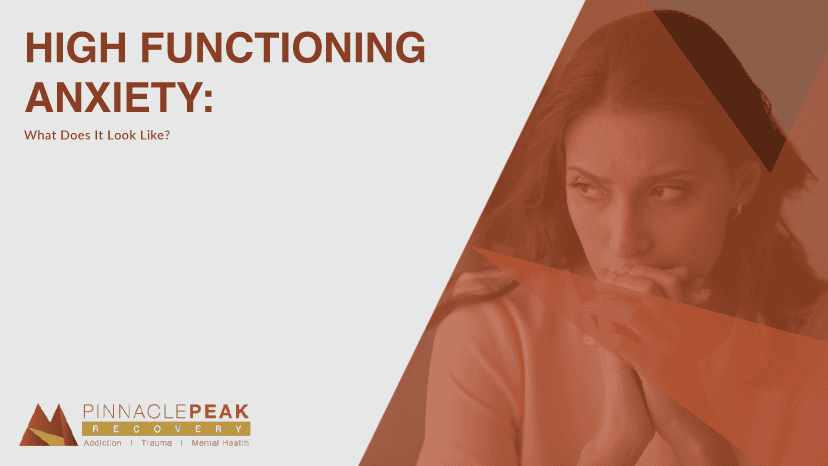“Anxiety’s like a rocking chair. It gives you something to do, but it doesn’t get you very far.”
― Jodi Picoult, Sing You Home
Often, when we think about an anxiety disorder, we imagine a person living with so much fear they curl up under the blankets and stay in bed, afraid to speak to another person and unable to do anything but worry. Or you might imagine someone who runs like they’re driven by a motor, talking as quickly as they can, unable to slow down and think, jumping from one thing to the next, too afraid to slow down.
But many people with anxiety get up in the morning, have breakfast with their family, and head to work, all without giving any indication that anything is wrong. Unfortunately, on the inside, they may worry constantly, asking themselves “What if the kids don’t get out the door to the bus on time?”, “What if I get in an accident on the way to work?”, “What if I get to work and my coworker asks me a question I don’t know how to answer?” These people may be able to perform the day-to-day functions of everyday life without comment and carry their fears in silence.
Anxiety may make you feel isolated, especially if you are good at keeping it to yourself. You are not alone: in a 2021 National Alliance on Mental Illness survey, 41% of people in Arizona reported experiencing symptoms of anxiety or depression. Here at Pinnacle Peak, we know that everyone experiences anxiety differently; that’s why we work with clients one-on-one to ensure that their individual needs are met and that they are supported in every aspect of their lives.
We know how painful anxiety can be, so let’s dive into explaining what it might look like for you.
Defining High-Functioning Anxiety
High-functioning anxiety is not a medical diagnosis, and it is not a term that is recognized by the Diagnostic and Statistical Manual of Mental Health Disorders (DSM). Rather, the term colloquially refers to someone who does not necessarily show the traditional signs of a generalized anxiety disorder or other anxiety conditions.
These people may be able to complete their daily tasks without obvious difficulty, which can lead to their diagnosis being overlooked. However, it may be that a person’s anxiety is driving them to be high-achieving or to get their daily tasks done.
While this may make them appear to be functional and even successful, it can be a difficult way to live because their anxiety works as their primary motivator. This can lead to a life lived out of fear, and it may make it difficult for people to get in touch with their feelings, as they spend so much time masking their anxiety symptoms.
High-Functioning Anxiety Symptoms: What Are They?
No two people experience anxiety the same way, so symptoms often differ from person to person. However, there are some common symptoms that you can watch out for.
From the outside, a person who is good at masking or working with their anxiety symptoms may look like someone who’s:
- A perfectionist
- A strong student or employee
- Highly ambitious
- Always on time or ahead of schedule
- Highly organized
- Detail-oriented
While these all sound like positive traits, the driving force behind them can be a cause for concern. For people with anxiety, these habits are born out of a place of fear. They may be afraid that if they don’t exhibit all of these traits, their peers will perceive them negatively; they often consider themselves failures.
While putting on a good face when interacting with others, people with anxiety may be having a hard time internally with things like:
- Sleeping or getting out of bed
- Decision-making
- Concentrating
- Relaxing
- Checking details
- Overthinking situations
- Disappointing others
- Self-doubt
- Restlessness
- Sudden or unexpected irritability
People who are considered “high functioning” are often good at hiding their anxiety. Being driven for success by anxiety is unsustainable and will usually lead to burnout in the long term.
Risk Factors for High-Functioning Anxiety: What Do They Look Like?
A few different things can put you at risk for an anxiety disorder. For example, if you have a parent who you watched deal with anxiety during your childhood, you are much more likely to experience anxiety yourself. If other family members have a history of anxiety, that may also put you at higher risk.
Many environmental factors put you at a higher risk for anxiety, such as long-term stress or cultural standards. In some cases, physical health problems such as vitamin deficiencies and thyroid concerns can lead to anxiety. Anxiety can also be a part of additional mental health conditions, such as depression or post-traumatic stress disorder (PTSD).
However, just because you have some risk factors for anxiety does not mean you are going to develop an anxiety disorder. Alternatively, some people experiencing an anxiety disorder don’t have traditional risk factors associated with anxiety.
The Effects on Daily Life: Living With High-Functioning Anxiety
Anxiety can put a real strain on the mental health and relationships of the person who is experiencing it, even if that is not obvious from the outside. People who are living with an anxiety disorder may feel unable to be open about it and may find it difficult to have authentic relationships with others. Even people who appear to have lots of friends and strong intimate relationships may feel very lonely because they try to deal with problems on their own.
People who use their anxiety to motivate their achievements tend to over-fill their schedule, such as taking on extra assignments at work or school, doing lots of volunteer work, or trying to solve other people’s problems for them. By being constantly on the go, people who are masking their anxiety ensure that they don’t have time to worry or think about their anxiety.
Managing High-Functioning Anxiety for Myself
There are many different things you can do to manage your anxiety. The most important thing you can do is get in touch with your feelings and your body to identify what, if anything, is specifically causing you to feel anxious.
Some techniques for managing anxiety include:
- Eating regular, healthy meals
- Good sleep hygiene (not over or under-sleeping)
- Staying hydrated
- Exercising regularly
- Mindfulness activities to keep you in the moment
- Positive self-talk
- Finding ways to express yourself
- Relaxing activities
- Making time to deal with things you’re worried about
- Confiding in close friends or family members
These are just a few steps you can take in your everyday life to reduce your anxiety symptoms. These activities may make you feel better but they won’t solve the problem entirely. If you are experiencing difficulty managing anxiety on your own that’s okay, there are other options to get help managing your anxiety.
Treatment for High-Functioning Anxiety in Arizona
The best treatment for anxiety might look different depending on the individual, but it is important to remember that you have options when it comes to your care.
Cognitive behavioral therapy is commonly used to treat GAD and other anxiety disorders. CBT focuses on identifying the relationship between the thoughts and feelings you experience as well as the behaviors you take part in and how to reroute them.
Cognitive processing therapy is a subtype of CBT that is used specifically to treat anxiety and PTSD. It deals with breaking down how your perception of events has a direct impact on your feelings and behaviors, and learning how to readjust.
Dialectical behavior therapy (DBT) is another option for treating anxiety. This method will help you differentiate between what you can control and what you cannot control. This is especially effective with anxiety because identifying what you cannot control may help you worry less.
In addition to different types of talk therapy, some people find that medication helps them deal with anxiety. Always consult a healthcare professional before beginning a new medication.
Here at Pinnacle Peak Recovery, we offer evidence-based, nationally recognized treatment options provided by master’s-level therapists for a full continuum of care.
Whether you want to begin treatment for anxiety for the first time or it is something you’ve dealt with for a long time, Pinnacle Peak Recovery is here for you. Just give us a call anytime at (866) 377-4761 and we’ll get you started on the road to healing.
Clinical Excellence | Compassionate Care | Family Feel



